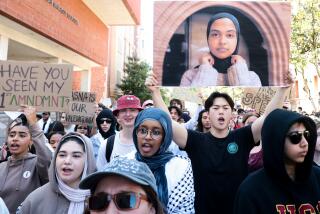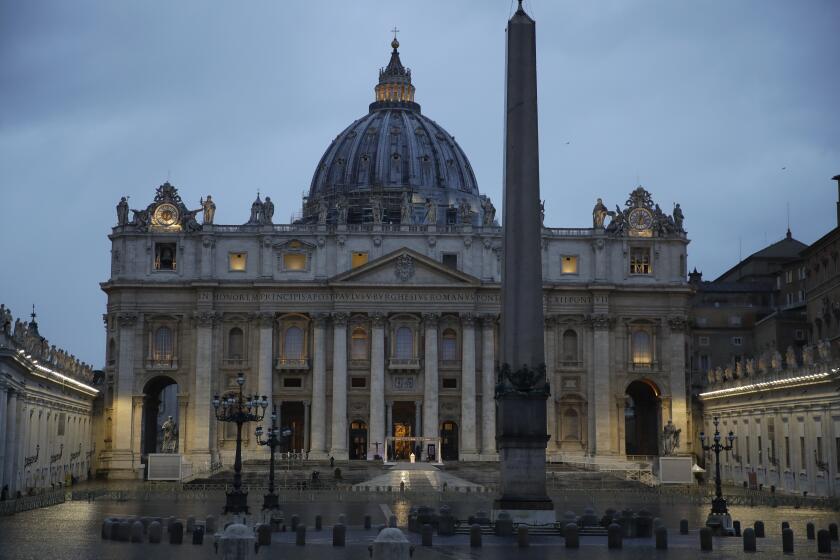Mayor Begins His Shake-Up of the City’s Commissions
Three and a half weeks into his administration, Mayor Antonio Villaraigosa has started to put his stamp on City Hall by shaking up the citizen boards and commissions that oversee much of what the city of Los Angeles does.
The new mayor has replaced all but one member of the Police Commission; this week, he is expected to appoint new members to the Airport Commission. Ultimately, he could replace more than 300 appointees on 55 boards and commissions.
The unique system Villaraigosa presides over was designed to take the politics out of city government. But more recently, it has come to symbolize a City Hall beset by corruption and insider influence.
Villaraigosa’s victory over former Mayor James K. Hahn came amid allegations that several Hahn commissioners had improperly mixed city business with political fundraising.
The new mayor has indicated he wants to set a different standard, announcing within days of taking office that his commissioners would have to sign ethics pledges.
But several political observers say Villaraigosa could do even more to rejuvenate the ailing commission system. Among their suggestions:
* Appoint commissioners who bring more expertise to their roles overseeing major city functions, including the airports, the municipal utility and the port.
* End the practice of rewarding political supporters with seats on the most powerful boards and commissions.
* Allow boards and commissions to work as independent oversight bodies, rather than as extensions of the mayor’s administration.
That was the vision that drove good-government reformers who campaigned to create citizen commissions nearly a century ago.
At the time, Progressive-era reformers hoped that giving volunteers oversight of city services would inoculate the young city from the kind of corruption and machine politics that dominated New York and Chicago.
“The early impulse was to put professionals, industrialists on these boards,” said Steve Erie, a UC San Diego political scientist who has written extensively about the early commissions. “They weren’t amateurs.”
Commissions filled with members of the city’s business elite were put in charge of the airport, the port and the Department of Water and Power, multimillion-dollar agencies that were undergoing major expansions to keep up with the city’s growth.
Over the years, Los Angeles also created boards and commissions to oversee the library, the Police Department and the zoo, to evaluate development in specific areas of the city, to promote city programs for women, children and trees.
Several have responsibility for awarding hundreds of millions of dollars worth of contracts annually. Until recently, airport and harbor commissioners personally negotiated leases with international airlines and shipping companies.
All are volunteer, except the Board of Public Works, whose five members are each paid $108,179 and have direct responsibility for managing the city’s $900-million public works operation, including construction of city streets, sewers and public buildings.
City boards and commissions were never as apolitical or incorruptible as Progressive idealists dreamed. But over the years, the system lost much of its early promise, a trend that accelerated in recent years, critics charge.
Instead of leading businesspeople or professionals with experience running large organizations, many commissioners have appeared to be political allies of the mayor who appointed them.
Starting with Tom Bradley, mayors have used the system to diversify city government by appointing African Americans and other minorities to positions on city boards and commissions, a move applauded by many.
But the city’s last three mayors -- Bradley, Richard Riordan and Hahn -- also rewarded their fundraisers and contributors with seats on commissions.
Hahn put Nicholas G. Tonsich, a little-known San Pedro attorney, at the head of the commission overseeing the fifth-largest port in the world after Tonsich raised money for Hahn’s 2001 mayoral campaign.
Hahn put Ted Stein, another major fundraiser, at the head of the Airport Commission. Stein, who was also named to a commission by Riordan, resigned last year amid allegations that he had pressured at least one airport contractor to make political donations, a charge he denied.
A subsequent Times investigation also showed that Stein and Tonsich helped raise thousands of dollars for Hahn campaigns from companies that had pending and recent business with their commissions, a potential violation of city ethics rules.
Hahn also appointed relatives of some of his biggest supporters, putting Stein’s wife on the Board of Public Works and tapping the son of former DWP Commissioner Dominick Rubalcava for a seat on the Board of Animal Services.
And Hahn, whose reelection bid drew its greatest support from organized labor, appointed several union leaders to major commissions.
Some critics say the pressures on mayors to fill commissions with political allies and appointees who reflect the city’s ethnic and geographic diversity have complicated the job of finding qualified commissioners.
The governing board of Edison International -- the parent company of utility Southern California Edison -- has among its members two university presidents, three CEOs and the retired president of one of the country’s largest foundations.
By comparison, the board of the DWP -- the largest municipal utility in the country -- has a local union leader, the head of a small public relations firm, a pastor and a 31-year-old attorney.
While professional expertise on commissions has slipped, the city’s last three mayors have also increasingly treated commissions not as an independent branch of government but as extensions of their office, say political observers.
Commissioners tell of getting calls from the mayor’s office with instructions about how to vote on controversial issues; some have been removed after voting against the mayor’s wishes.
Former Cultural Heritage Commission President Mike Cornwell, who served Hahn and Riordan, said he remembers getting a call two years ago to go to the mayor’s office as his commission was considering the fate of a historic Crenshaw Boulevard bowling alley.
The Cultural Heritage Commission is charged with assessing how to protect local historic buildings. But Cornwell said he was told to vote against designating the bowling alley a landmark, a move that could have complicated a retail development planned for the site.
“I was a little uncomfortable,” he said. “But he’s the mayor.”
Riordan required all his commissioners to sign undated resignation letters to allow him to easily remove them.
“Clearly, over time they have become extensions of the mayor’s administration,” said Cal State Fullerton political scientist Raphael Sonenshein, who has written extensively about local government.
When the City Charter was changed six years ago, however, mayors were given more authority over commissions as the City Council was stripped of its power to block the dismissal of most commissioners.
Erwin Chemerinsky, a Duke University law professor who led a commission that worked on charter reform, said the intent was to “give the mayor more control. Then, if the mayor or his commissioners don’t do a good job, hold the mayor accountable.”
Chemerinsky said he now thinks that may have been a mistake because he believes commissioners are more likely now to feel they are serving the mayor rather than the city at large.
Villaraigosa has given no indication that he plans to weaken the mayor’s grip on the boards and commissions, however.
His chief of staff, Robin Kramer, said the new mayor would follow Riordan’s practice, requiring commissioners to sign undated resignation letters.
Kramer, who was also Riordan’s top aide, said the mayor would strengthen the system by appointing a higher caliber of commissioners. “Great people are not the answer to everything, but they can go a long way toward making these commissions able to bring that fresh perspective into city government,” she said.
Villaraigosa has already won praise by appointing respected local civil rights leader John Mack and two former U.S. attorneys to the Police Commission, which deals often with the emotionally charged controversies that follow the Police Department’s use of force.
But the mayor’s first commission appointments have also been familiar names, including Cynthia Ruiz, a close Villaraigosa family friend whom Hahn ejected from the Public Works board in the heat of the mayoral campaign.
Villaraigosa put Ruiz, a rehabilitation counselor, back on the board and made her its president.
More to Read
Start your day right
Sign up for Essential California for news, features and recommendations from the L.A. Times and beyond in your inbox six days a week.
You may occasionally receive promotional content from the Los Angeles Times.







